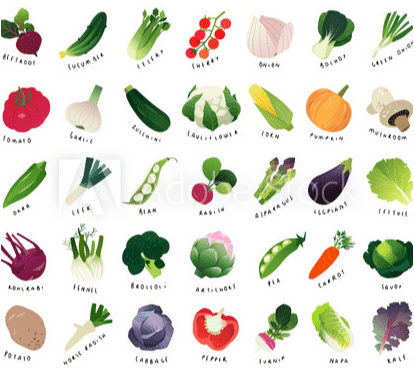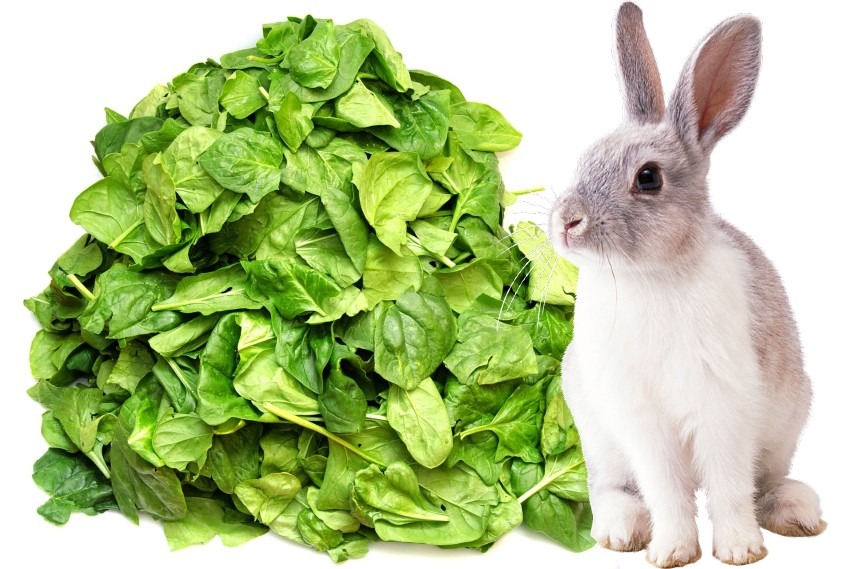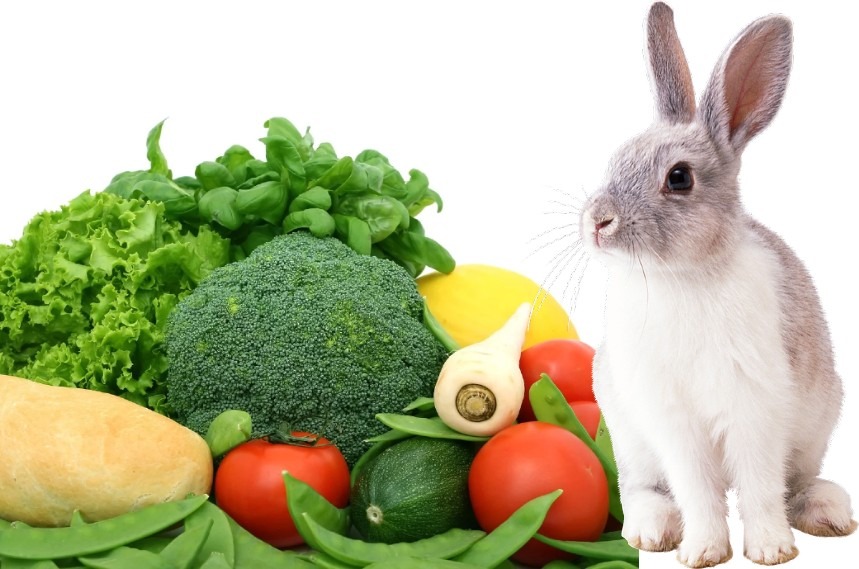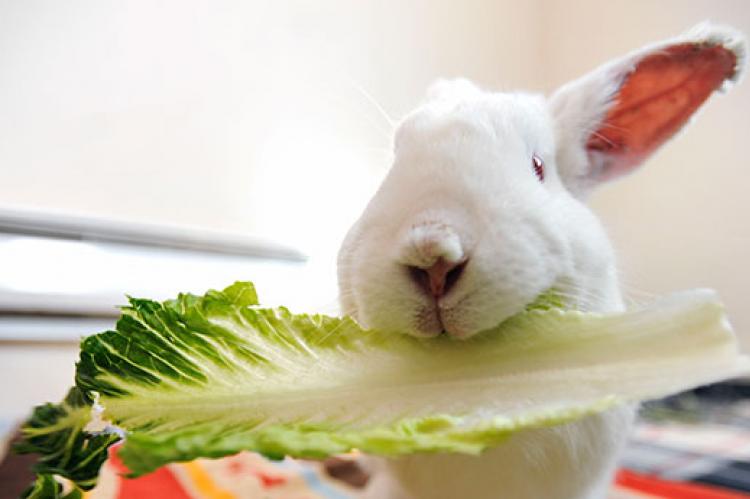Rabbits are herbivorous, and they need high fiber in their diet to keep their intestines functioning properly. High fiber wears down their continuously growing teeth and prevents them from becoming bored. As a pet owner, it is your responsibility to ensure your rabbit is fed a suitable diet. The daily diet of a pet rabbit should consist mainly of a large quantity of hay or dried or fresh grass to provide the necessary fiber.
But what about vegetables for rabbits?
Many of us have a big misconception about the rabbit’s diet, and we think that rabbits need lots of carrots and lettuce with a regular portion of commercial food. In actual rabbits don’t eat fruits and vegetables in the wild, and carrots are only suitable for your furry friend as an occasional treat.
Primary diet source of a rabbit:
Rabbits tend to graze throughout the day in need of sustaining their appetite. They love food, and getting a balanced diet is essential to keep them healthy. The bulk of rabbits’ balanced diet consists of good quality grass or hay equivalent to their body size.
Fresh grass or lawn clippings are not suitable for rabbits when provided in excess because these can ferment quickly. Rabbits need fresh hay as it maintains the general health of your bunny, and the rest of the diet can be made up of fresh leafy greens.
Vegetables for rabbits:

Vegetables and greens are an ideal way to diversify the diet of your rabbit and provide nutritional and mental enrichment to your bun. Thinking of the rabbit’s overall diet means you have to provide those greens and veggies loaded with incredible nutrients. These nutrients include vitamins, minerals, antioxidants, and water for the essential hydration to your rodent friend.
The greens and vegetables are excellent sources of vitamins A, B, C, and K.
These diet components also provide soluble fiber and traces of minerals such as Copper, Iron, Manganese, and Zinc. These dietary items have phytonutrients that are only found in plants. Plants contain more than 25,000 phytonutrients, including flavonoids and carotenoids. The exact need of most of the phytonutrients is not known. Still, they help to boost the immune system, deal with the common issues associated with aging animals like joints or skin diseases, and protect the body from stress.
Vegetables that rabbits can eat:
From the age of three months, you can start introducing a wide range of vegetables to your bunny. As a pet parent, you need to serve three different vegetables to your rabbit in a day. Always introduce vegetables to your rabbit one by one to get an idea of which ones are digested more quickly and which ones are not. Rabbits can eat a variety of vegetables that include:
- Basil
- Beetroot greens
- Broccoli
- Carrot roots and tops
- Cauliflower
- Celeriac
- Celery
- Coriander
- Courgette
- Curly Kale
- Dark green cabbage
- Dill
- Fennel
- Green peppers
- Marrow
- Mint
- Parsley
- Parsnip
- Radish
- Rocket
- Spinach
- Spring greens
- Sprouts
- Squash
- Sweet potatoes
- Tomatoes
- Watercress
Ways to add vegetables and fruits to your rabbit’s diet:
The only rule to follow while giving anything to your pet rabbit is “MODERATION”!
Rabbits have a sensitive stomach. That is why it is necessary to limit the mixing up of their diet. Introducing vegetables and fruits to your rabbit’s diet requires proper check and balance. Add a fruit or vegetable in a smaller quantity first and then monitor your pet to observe any diverse reaction.
Can vegetables and fruits be dangerous for rabbits?
Many types of fruits and vegetables are safe and healthy for your rabbit when feeding in moderation. Still, there are some other vegetables and fruits that can be poisonous to rabbits. In addition to the grains and legumes, few fruits are notorious for causing rabbit GI problems when fed improperly. Mainly you need to stick with high-fiber vegetables, fruits, and herbs for your little bun.
Vegetables and fruits contain a high load of starch and sugars that can cause various problems, and these are only beneficial when served in a small part of the diet. Mushrooms, potatoes, broad beans, iceberg lettuce, and kidney beans are the vegetables poisonous for rabbits.
When it comes to feeding leaf vegetables to the rabbit, avoid cauliflower and chard as these are harmful to rabbits as these cause colic and bloating. Light-colored lettuce such as iceberg contains lactucarium that is harmful to your furry friend if ingested.
How many vegetables are enough for a rabbit?

Herbs and vegetables are among the most favorite foods of your bunny. Still, it would help if you were alert in serving this desired food for rabbits. Only two cups of fresh vegetables are enough for adult rabbits. Use a variety of two to three vegetables.
For adult rabbits under 5 pounds or the dwarf breed of rabbits require only one cup of fresh vegetables. Every time you add only one new vegetable to their diet, if you observe signs of diarrhea or loose stool, stop giving that vegetable to your bunny.
Carrots for rabbits:
It is a myth that rabbits eat only carrots, but it is not the complete truth. According to veterinarians and animal scientists, pet rabbits must consistently eat hay as their everyday meal and diet. Hay is their leading food, while vegetables, particularly root and green leafy, are only additional food sources for pet rabbits.
Because of less cellulose and complex carbohydrates in carrots and other root vegetables, pet rabbits would have difficulty digesting these vegetables. Carrots are packed with a lot of sugar, and it can cause rabbits to develop tooth decay. Carrots can be their favorite treats, but use these as a special treat for your bunny. Rabbits love carrots, but as a responsible pet owner, you must give carrots to him only as a training treat.
Conclusion:
Vegetables are also an essential part of a rabbit’s diet; fresh greens give your pet rabbits essential vitamins and minerals. Always feed them a balanced diet with a maximum of fresh hay and a balanced amount of vegetables and fruits.
The digestive system of your rabbit is susceptible to spoiled food, so give him the best and keep them hydrated 🙂

